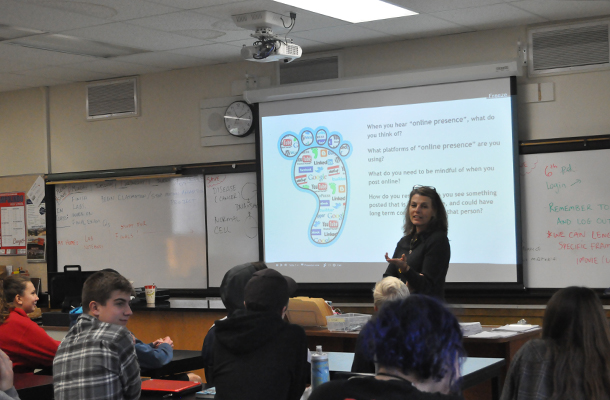Cyber Program Promotes Cautious Behavior
January 12, 2017
2016-2017 marks the 2nd academic school year the Acalanes Union High School District will participate in the Digital Citizenship Education Program (DCEP) designed to educate students on internet safety.
“It’s really just an awareness program,”said Mrs. Findlay, associate principal. “We want all of our students to be aware of their online presence, cybersafety, [and] academic honesty.” The program focuses in on these concepts, making sure students have a complete understanding of them, and know how to navigate online while remaining safe.”
“Our librarian met with every freshman student last year, and she’s doing it again this year,” Findlay said. “Every class goes in, and does some kind of research project [in the library],” she explained. “Ms. Morgan talks about academic honesty and integrity.”
Findlay explained that program advocates, including Leadership, are “asking teachers during their reading period if they could have this open for discussion.”
The emphasis on cyber etiquette is in response to district-wide interest in helping students maintain safe and responsible online habits. “There was a committee at the district level… not last summer but the summer before,” Findlay said. “Every school was part of it.”
“It’s happening in all the schools in slightly different ways,” Findlay explained. At Campolindo, Leadership students will talk to classes as part of the program. In addition, teachers will be speaking to 4th period classes about online behavior.
“I really think there should be a program that makes students aware of cybersafety,” said history teacher Ms. Webb-Peploe. “I think it will inspire really interesting conversation.”
“I think this year’s mini presentations are a first step, but they’re not a comprehensive step,” Webb-Peploe explained. “There’s always more to learn when it comes to to using the online interface.”
“Whenever they’re posting, they need to understand the permissions [privacy] on any kind of website or program that they’re using,” Findlay said. “[When] we go onto different websites, we don’t realize maybe on Facebook our permissions aren’t set, and everybody in the world could see what we’re doing.” DCEP preaches alertness of one’s appearance to others on the internet.
“I know there are other teachers who would have preferred a little more training and talking about digital citizenship, primarily because they aren’t online in social media,” said Webb-Peploe.
Freshman Julia Zapanta is confident that she demonstrates caution when operating online. “I feel safe online,” she said. “I make sure to change my password every few months. I have a username that’s not my name.”
Zapanta is in favor of additional cyber responsibility training for students. “It would be helpful to have some type of program that could tell students to be aware, when you’re online,” she said. “You don’t want to be doing something that you don’t know anything about.”
